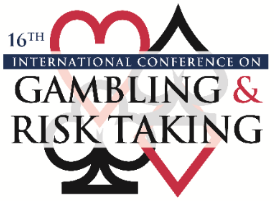Submission Title
Cognitive Restructuring for the Treatment of Gambling Related Thoughts: a Systematic Review
Session Title
Session 4-1-C: Delivering Treatment
Presentation Type
Event
Location
The Mirage Hotel & Casino, Las Vegas, Nevada
Start Date
10-6-2016 8:30 AM
End Date
10-6-2016 10:00 AM
Disciplines
Clinical Psychology | Psychology
Abstract
Cognitive restructuring is the best practice for treating gambling related thoughts, but some therapists do not apply this technique due to a lack of training regarding its application. The increase of skill game players (e.g., poker) entering treatment adds a challenge for therapists because these gamblers present with different thoughts than those of other gamblers usually encountered in treatment (e.g., EGM). This systematic review aims to describe how cognitive restructuring is carried out with gamblers, particularly skill game players, based on the evidence available in empirical studies that include cognitive interventions for gambling. Of the 2607 studies collected, 41 were retained. Results highlighted exposure as the most frequently used technique to facilitate identification of gambling related thoughts (imaginal = 19.5%; in vivo = 12.2% of studies). More than half of the studies (63.4%) clearly reported therapeutic techniques aimed at correcting gamblers’ thoughts, of which 30.8% involved visual support to challenge the thoughts (e.g. node link mapping, ABC log, cue-cards). Of the 41 retained studies, 46.3% included skill game players in their sample. However, 94.7% of these studies did not mention if cognitive restructuring had been adapted for these players. It was also observed that several terms referring to gamblers’ thoughts were used interchangeably (e.g. erroneous, dysfunctional, irrational or inadequate thoughts), although these terms could each refer to specific content. Clinical implications of the results are discussed with regards to the needs of therapists, but also in relation to editing constraints of scientific journals that may limit detailed description of cognitive restructuring procedures.
Keywords
Cognitive restructuring, gambling related thoughts, skill game, systematic review
Included in
Cognitive Restructuring for the Treatment of Gambling Related Thoughts: a Systematic Review
The Mirage Hotel & Casino, Las Vegas, Nevada
Cognitive restructuring is the best practice for treating gambling related thoughts, but some therapists do not apply this technique due to a lack of training regarding its application. The increase of skill game players (e.g., poker) entering treatment adds a challenge for therapists because these gamblers present with different thoughts than those of other gamblers usually encountered in treatment (e.g., EGM). This systematic review aims to describe how cognitive restructuring is carried out with gamblers, particularly skill game players, based on the evidence available in empirical studies that include cognitive interventions for gambling. Of the 2607 studies collected, 41 were retained. Results highlighted exposure as the most frequently used technique to facilitate identification of gambling related thoughts (imaginal = 19.5%; in vivo = 12.2% of studies). More than half of the studies (63.4%) clearly reported therapeutic techniques aimed at correcting gamblers’ thoughts, of which 30.8% involved visual support to challenge the thoughts (e.g. node link mapping, ABC log, cue-cards). Of the 41 retained studies, 46.3% included skill game players in their sample. However, 94.7% of these studies did not mention if cognitive restructuring had been adapted for these players. It was also observed that several terms referring to gamblers’ thoughts were used interchangeably (e.g. erroneous, dysfunctional, irrational or inadequate thoughts), although these terms could each refer to specific content. Clinical implications of the results are discussed with regards to the needs of therapists, but also in relation to editing constraints of scientific journals that may limit detailed description of cognitive restructuring procedures.

Comments
Attachment: PDF containing 21 slides
Title slide: Cognitive Restructuring of Gambling-Related Thoughts: A Systematic Review